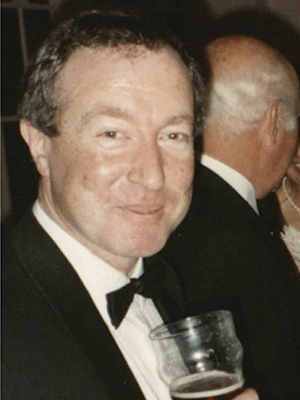 David Tyrell was born on 2 November 1948 in Essex and died on 29 January 2024 at Stockton-on-Tees, aged seventy-five.
David Tyrell was born on 2 November 1948 in Essex and died on 29 January 2024 at Stockton-on-Tees, aged seventy-five.
At the age of eleven David went to Colchester Royal Grammar School for boys, a well-renowned school, after which he went to Leeds University where he gained a BA in History. His first job after graduating was working in a traditional grocers’ shop in Braintree, Essex. He once said that the most enjoyable part of the job was doing the deliveries on a bike similar to Granville’s in ‘Open All Hours.’
He spent a year at the University of Liverpool to gain his Post Graduate Diploma in Archive Administration.
His first appointment as an archivist was at Leeds City Archives, and in October 1972 he moved to North Yorkshire Record Office, working as Senior Assistant Archivist.
In 1974, David was promoted to the new Cleveland County Archives Department in Middlesbrough as part of Cleveland County Library Service, where he spent the rest of his career establishing and developing the archives service. He delivered a county wide service, initially from a converted Victorian terraced house at 81 Borough Road, Middlesbrough, making use of outstores as the volume of archives collected increased.
In 1984, he oversaw the conversion of the old Post Office in Exchange Square, Middlesbrough, into the new home of the archive service. This enabled him to transfer all of the archives held in outstores and other record offices to environmentally controlled rooms with new shelving, in line with the standards at the time. The facilities in the building allowed space for a large searchroom, areas for conservation, cataloguing and sorting of collections, a quarantine room for new collections, a large room for education and access programmes, and space for up to ten years of new accessions. Soon after, the number of professional staff increased, with an Archive Conservator to work in the new conservation workshop, and later, a full time Education and Outreach post which was shared.
When Cleveland County Council was abolished, David steered the archive service into its new incarnation as Teesside Archives, delivering a service to the four new district authorities.
David promoted the archive service through talks and exhibitions and managed two large, externally funded projects: The Cleveland County Oral Archive Project, which resulted in the collection of hundreds of hours of taped recollections from residents of Cleveland and is one of the most popular collections held at Teesside Archives today; and The British Steel Project, which, in partnership with Teesside University, enabled the cataloguing and promotion of a large collection of records formerly held by British Steel. This project finally gave the service the opportunity and funding to introduce CALM which allowed the service to convert the old paper catalogues to electronic and to continue to create digital catalogues for new collections.
Promotion of the service also came through David’s association with the Friends of Teesside Archives, the Cleveland and Teesside Local History Society and the Cleveland Family History Society. The Friends of Teesside Archives were especially helpful in supporting the service by raising money for equipment, promoting access to collections, and helping with outreach projects.
He was a long-standing member of the Society of Archivists and the Business Archives Council and assiduously attended meetings.
David created a network of friends outside work with a busy social life which included attending classical and other concerts throughout the country, reading, watercolour painting, collecting antiques, and attending horse race meetings. Once he had retired, he made it a goal to visit every racecourse in the country. He was a member of the Middlesbrough Rotary Club, holding most of the positions at one time or another, including President, and was often seen raising money in local supermarkets.
When once asked what he would do if he had a magic wand, David responded that he would rid the landscape of pylons, which he hated. And when asked the same of unlimited powers, he replied that he would end war and conflict. He loved being retired so that he could pursue his interests, travel more and see friends.

